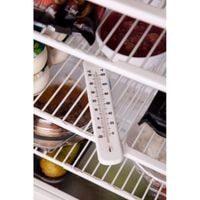Why does my freezer smell. A wave of cold air should be the only thing you notice when opening your freezer. Something may be wrong if the air you’re breathing has a funky, unpleasant smell.
You should solve the problem immediately. You should be able to find and remove the source of this smell easily, but if you can’t, a thorough cleanup may be necessary.
Why does my freezer smell
Most of the time, when you first use your freezer, it might not seem to be cooling as well as it should be. This is because air becomes stagnant and bacteria will thrive in this circumstance.
While normally, your freezer would be set at a temperature of 0°F to keep food items frozen and prevent any from becoming spoiled.
If there is food with bacteria already in your refrigerator and then placed into your freezer for storage for example, that bacteria will begin to grow again once it is warmed up inside your freezer.
You’ll want to go through all of the corners of the freezer and make sure you clean thoroughly so that anything that has potentially gone bad or stinks can get thrown out right away before it contaminates other foods.
How to get rid of a bad smell
Starting with the easiest tasks, we will work our way down to the most challenging. Let’s begin with something so simple as flicking our wrists.
Reduce the temperature

Turning down the temperature of your fridge is probably one of the simplest solutions. As a best practice, your refrigerator should be set at about 35°F (1.7°C).
If you live in an area with a high level of humidity, going a bit lower might be necessary to prevent excess moisture from accumulating inside your browning appliance.
Check the door first, then other places
As much sense as it may make in theory, people forget about the perishability of food when it comes in a box, vacuum-sealed package, or plastic bag.
Without air to circulate, your food has less chance of staying good, and even with refrigeration, things can still spoil, often surprising you with their suddenness.
So check back to all of your past purchases observed from the front of your fridge to the back section without fail once a week.
Smell and peek inside everything that is either too large to be easily stowed away or anything that seems dubious.
Obtain some chemical assistance
Silica gel can help to keep unwanted odors from entering your fridge and destroying the produce you’ve worked hard on preserving. They are inexpensive, and one pack will last a very long time.
Every month or so, swap out the old ones with a fresh set of mats just to be sure they continue to do their job.
You may also want to consider placing something odor-absorbing in-between two slices of bread, in a drawer, or even on an open shelf inside your fridge.
Baking soda is one of the most popular items used for its odor-absorbent properties, but you could always substitute charcoal, coffee grounds, and chopped-up lemons if even this does not work, though, then unfortunately, it’s time to take action.
Deep cleaning

Much of the time the solution may come down to a little hard work.
If your fridge still smells after steps 1-3, it’s time to start clearing out the mess in it.
Get a cooler, stuff all your food into it with some ice, then get cleaning.
Lots of fridges have spill-proof shelves these days. While they keep small spills from expanding into a big mess, it’s also the perfect hiding place for bacteria which creates odors very easily.
Tackle this problem by using your disinfectant to remove that stench as soon as you can.
Conclusion
If you have followed the steps listed above, but the order is still unavoidable, then you may need to make a dreaded call to an appliance repair service.
Odds are it could be an issue of mold or odor coming up from the drain located under your fridge.
It could also be caused by damaged or dirty water filters that emit odors over time. If your fridge has a buildup in the drainage system, it could also cause a foul smell too.
Why does my freezer smell
Related Guides
